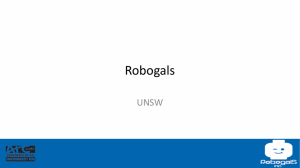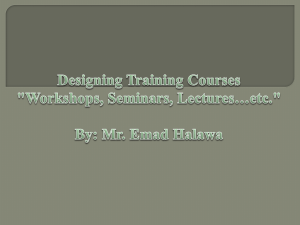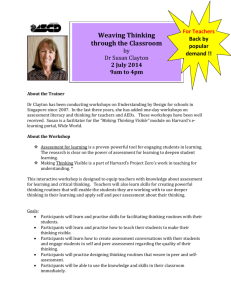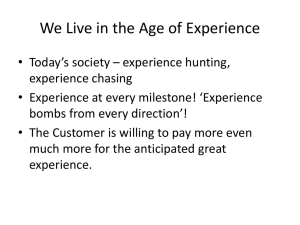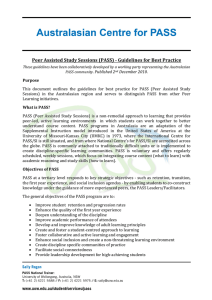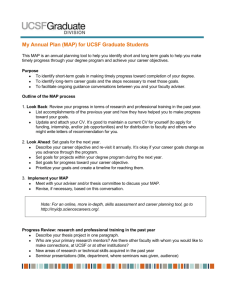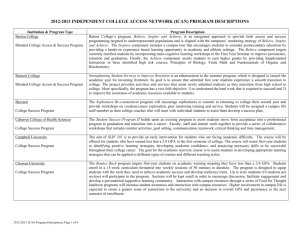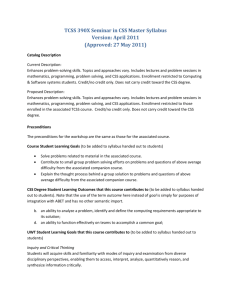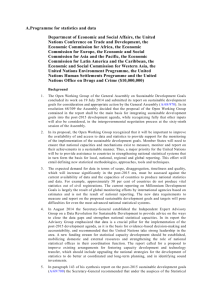Final Report - Forward with Integrity
advertisement
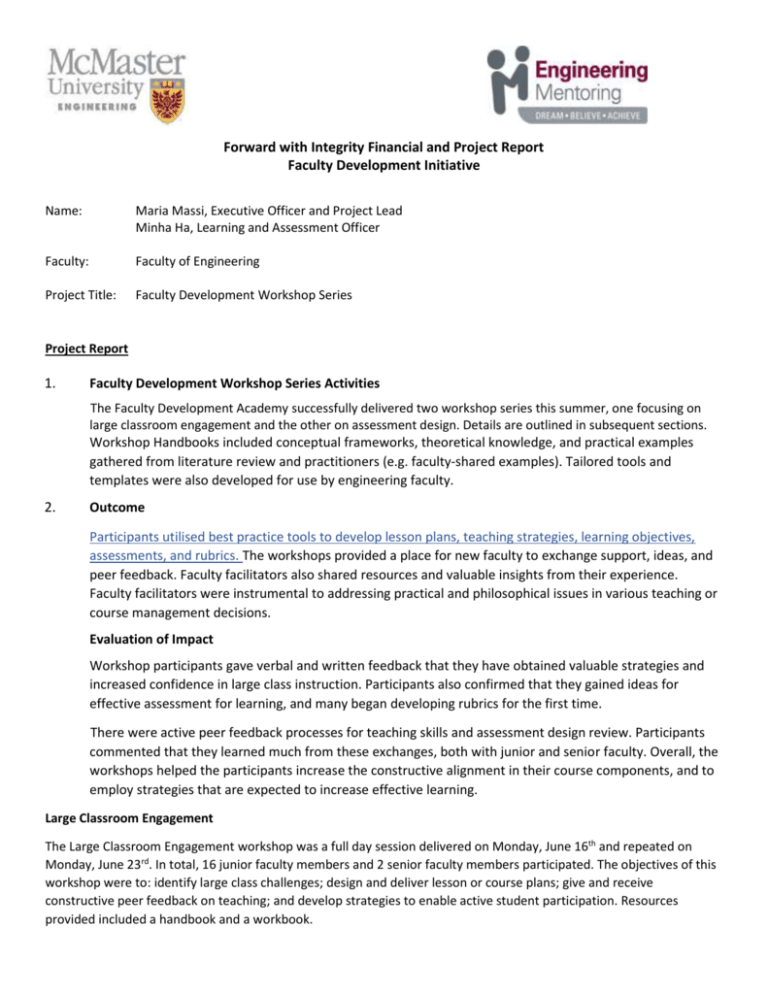
Forward with Integrity Financial and Project Report Faculty Development Initiative Name: Maria Massi, Executive Officer and Project Lead Minha Ha, Learning and Assessment Officer Faculty: Faculty of Engineering Project Title: Faculty Development Workshop Series Project Report 1. Faculty Development Workshop Series Activities The Faculty Development Academy successfully delivered two workshop series this summer, one focusing on large classroom engagement and the other on assessment design. Details are outlined in subsequent sections. Workshop Handbooks included conceptual frameworks, theoretical knowledge, and practical examples gathered from literature review and practitioners (e.g. faculty-shared examples). Tailored tools and templates were also developed for use by engineering faculty. 2. Outcome Participants utilised best practice tools to develop lesson plans, teaching strategies, learning objectives, assessments, and rubrics. The workshops provided a place for new faculty to exchange support, ideas, and peer feedback. Faculty facilitators also shared resources and valuable insights from their experience. Faculty facilitators were instrumental to addressing practical and philosophical issues in various teaching or course management decisions. Evaluation of Impact Workshop participants gave verbal and written feedback that they have obtained valuable strategies and increased confidence in large class instruction. Participants also confirmed that they gained ideas for effective assessment for learning, and many began developing rubrics for the first time. There were active peer feedback processes for teaching skills and assessment design review. Participants commented that they learned much from these exchanges, both with junior and senior faculty. Overall, the workshops helped the participants increase the constructive alignment in their course components, and to employ strategies that are expected to increase effective learning. Large Classroom Engagement The Large Classroom Engagement workshop was a full day session delivered on Monday, June 16th and repeated on Monday, June 23rd. In total, 16 junior faculty members and 2 senior faculty members participated. The objectives of this workshop were to: identify large class challenges; design and deliver lesson or course plans; give and receive constructive peer feedback on teaching; and develop strategies to enable active student participation. Resources provided included a handbook and a workbook. Commonly expressed challenges in large classroom teaching were identified as follows: 1. Ability to exchange dialogue and respond flexibly to the students or classroom dynamics 2. Ability to motivate active and shared ownership of classroom learning 3. Ability to monitor or accurately perceive signs of learning process 4. Ability to create a sense of trust and belonging in and out of classrooms Participants demonstrated a superb ability to translate general teaching techniques into applicable strategies for engineering classes. Explored teaching techniques included: Rank order questions, concept maps, focused listening and direct paraphrasing, Participants found the workshop materials, peer learning, and faculty facilitator input as valuable resources. Faculty facilitators were especially important for aligning participants’ perspectives with regards to fair expectations, principles of engagement, role of teachers and students, accepted uncertainties, and institutional culture. Many participants were not familiar with the lesson design framework (BOPPPS) nor learning outcomes (particularly, Bloom’s taxonomy). The workshop has contributed to raising the common level of knowledge in the field of instructional design. General feedback at the end of workshop included: increased confidence, ideas and strategies for improving teaching practice, identification of areas for continued progress, and eagerness to revamp lesson designs. Remaining questions were related to better interaction with students, and increasing student engagement. Furthermore, a post workshop online questionnaire was forwarded to all the participants where the effectiveness and value of the workshop was addressed and comments expressed were very positive. Participants noted that they benefited a great deal from the workshop and learned new concepts that they can now incorporate in their lesson plans or course development. Assessment Design The focus of the second workshop was on Assessment Design and this half day workshop was offered on Tuesday, July 29th and repeated on Wednesday, July 30th. In total, 14 junior faculty members participated. The objectives of this workshop were to develop strategies to improve alignment and effectiveness assessment practices against teaching and learning objectives and diversify assessment strategies, as fitting for learning objectives and accreditation purposes. Resources provided included a handbook and workbook. Participants identified interest and challenges in the following: 1. Ensuring fairness in grading and effective evaluation by assessment design 2. Diversifying assessment strategies to enhance learning 3. Assessing complex learning outcomes, including soft attributes 4. Evaluating the effectiveness of assessment design Participants negotiated course priorities and various course constraints to select methods and schedule assessments in their courses. Individual attention was given to increase clarity of learning outcome statements and rubric development. Participants found this process most helpful and indicated that there is great value to rubric development. Participants also found real-life examples of diverse assessment methods stimulating and helpful. In conclusion, both workshops were extremely successful and supported the Faculty of Engineering’s Invest for Excellence plan to construct new and effective learning experiences. The Faculty is committed to enhancing a learning environment that is engaging for our students and providing the best possible teaching experiences for our faculty members. The resources provided at the workshop will be made available on-line on the Faculty of Engineering website under the Faculty Development Academy link to share with members of the Faculty of Engineering and the broader McMaster community. Moving forward the Faculty of Engineering will provide these workshops again as it is anticipated that there will be a number of new hires. We also plan to extend the invitation to senior faculty as well since techniques covered in both workshops can help improve or enhance teaching strategies. Financial Report The Forward with Integrity funds allocated to support the Faculty Development Workshop Series were $4960.00. This funding was used to support the partial salary of a Student Assistant Researcher to assist with the summer long project commencing May 12th, 2014 to August 29, 2014 inclusive. The student hired for this position was Adam Sirutis, a fourth year Materials Science and Engineering, Management student. Adam was instrumental in researching a number of teaching and learning models that were incorporated in the resources provided for both the Large Classroom Engagement and Assessment Deign workshop handbooks as well as the workshop workbooks. The payroll totals to support the student salary were as follows: 2-14917-1111 (salary) = $9,932.02 ($4960 – FWI portion, $4972.02 – Faculty of Engineering portion) 2-14917-1111 (benefits) = $944.02 ( Faculty of Engineering) Other contributions from the Faculty of Engineering included staff and faculty time as well as minimal course materials.

